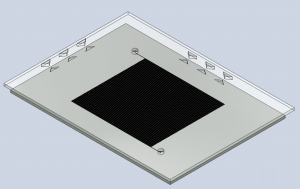Engineers Dr. Patrick Roman, Steward Schwarz, and graduate student Tomas Baca at the
AMERI Lab are currently working on a device to help facilitate the work of law enforcement
agencies. As we already know, the job of those in charge to keep the community safe can be a
dangerous one. Many times, officials are dealing with substances that they cannot rapidly
identify. This can present health and safety issues, as well as difficulty in making informed
decisions in the moment. Currently, there is a lengthy process of sample collection of an
unknown substance, sending it to a lab, waiting for lab results, doing all the paperwork, and then
submitting it for evidence in a trial. This can take weeks, sometimes months. Every department
of the justice system is backed up, and it is primarily because of the tedious and lengthy process
that is laboratory identification.
When our engineers successfully complete their research, they will have created a
portable gas chromatography system that separates chemical mixtures to allow police officers to
identify unknown substances on the spot. This device works by using MEMS silicon
micromachining that offers a micro-scale design and GC channel optimization for 1 meter to 5-
meter columns in a small ~1in 2 area. Silicon deep reactive ion plasma etch process is being used
to fabricate narrow (120um) and deep (200um) capillary columns in tightly packed 3×3 cm
chips. These chips will have lids bonded creating a sealed column. Next, the chips are coated
with a selection of stationary phases for testing the separation performance of various sample
mixtures, such as drugs and explosives. GC chip validation is accomplished by integrating the
uGC chips into a benchtop GC/MS system for GC peak separation characterization and
identification.


This would not only facilitate a dangerous job, but it could also help relieve the backup of
paperwork and legal cases waiting for evidence analysis. It is much like a domino effect, a small
improvement with a positive impact for everyone. We are looking forward to more updates on
this technology soon.
Recent Comments